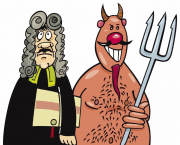The devil's advocate (Latin Advocatus diaboli) is a former official official official within the Catholic Church, the promoter of the faith (from the Latin promoter fidei) one who argued against the canonization of a candidate, trying to uncover any character flaws or misrepresentation of evidence in favor of canonization (e.g., inconsistency in evidence of supposed miracles, etc.).[2]
Nowadays and per analogy, in colloquial language, it is someone who defends a position contrary to the interests of the group whom he advises based on logical arguments or evidence, in order to judge the strength in the quality of the original argumentation and identify possible weaknesses in its logical structure. In short, it can designate a person who argues in favor of a point of view in which he does not necessarily believe, but who does so simply to present an opposite argument. This process can be used to check the quality of the argument and identify errors in its structure. [11]
History
The office of Devil's Advocate was established in 1587[3] by Pope Sixtus V and was abolished by Pope John Paul II in January 1983, with the stated goal of making the sanctification process simpler, faster, less expensive and more productive. The gathering of evidence was now the responsibility of the local bishops, and the legal discussion between the "devil's advocate" and the proponents of canonization ended. To prove the truth about the candidate's life, a College of Rapporteurs was now tasked with examining the case. These new guidelines led to a dramatic increase in the number of canonized individuals:[5] Some 500 canonized and more than 1300 beatified from that date until 2005, while there were only about 300 canonizations in the period from 1587 to 1983. [6] This suggests that the Devil Defenders did, in fact, reduced the number of canonizations. Some think it was a useful position to ensure that these procedures did not occur without a deserved cause, and that holiness was not very easily recognized. The last word in a canonization process belongs to the acting Pope. [7]
In cases of controversy, the Vatican may also seek testimony from critics of a candidate for canonization. A notable example of this occurred in 2003, when atheist Christopher Hitchens, an outspoken critic of Mother Teresa, whom he considered a fundamentalist fanatic and a fraudster, was interviewed as part of his beatification audiences. [8][9] Mother Teresa was declared a saint by Pope Francis in September 2016. [10]
 
References
- Fanning, William (1911). "Promoter Fidei". Catholic Encyclopedia. 12. New York: Robert Appleton Company. OCLC 811253232. Retrieved 12 July 2019.
- Woodward, Kenneth L. (1990). Making saints : how the Catholic Church determines who becomes a saint, who does not and why. [S.l.]: Touchstone. p. 376
- Burtsell, Richard (1907). 'Advocatus Diaboli'. The Catholic Encyclopedia. 1. New York: Robert Appleton Company. OCLC 875120339. Retrieved 19 January 2018.
- Leung, Rebecca (October 19, 2003). "The Holiness Debate." CBS News. Retrieved 12 July 2019.
- Stewart, Phil (February 18, 2008). "The Vatican clarifies, updates the process of creating saints." Reuters
- Schmalz, Matthew. "Who becomes a saint in the Catholic Church and that changes?" (in English). The conversation. Retrieved 16 January 2021.
- Leung, Rebecca (October 19, 2003). "The Holiness Debate." CBS News
- Hitchens, Christopher (October 20, 2003). "Dear mother: Pope beatifies Mother Teresa, a fanatic, fundamentalist and a fraud." Slate. ISSN 1091-2339
- Sherwood, Harriet (September 4, 2016). "Pope Francis canonizes Mother Teresa before Masses in St. Peter's Square." The keeper. ISSN 0261-3077
- "Devil's Defense Meaning". Idioms. Retrieved 12 July 2019.
Bibliography
- Woodward, Kenneth L. (1990). Making saints : how the Catholic Church determines who becomes a saint, who does not and why. -Touchstone
 


Comentaris publicats
Afegeix-hi un comentari: